Whether you’re looking for a new investment property or you’re evaluating your own portfolio, you need to know what makes a property profitable. You invest in real estate to earn money, and if a property isn’t going to deliver consistent and recurring rental income as well as long term appreciation, there’s no sense in buying it.
If you’re taking a look at your current portfolio or a home that you’ve been renting out for a few years and you’re trying to decide whether it’s profitable, you’ll want to look at a few things including:
Vacancy rates. Is your rental home occupied more than it's vacant? How much are you losing on vacancy periods between tenants? If it takes you a long time to rent your property, it’s likely not profitable.
Rental value. Is your rent set at market rates and are you raising it consistently during lease renewal and turnover periods? If the rent keeps going up, that’s a good indication that your property is profitable.
Property condition. Are you keeping up with improvements and upgrades in order to keep the home modern and attractive? This is necessary to continue attracting tenants. Profitable properties are not only well-maintained, but they’re also keeping up with market and tenant demands.
Tenant retention. Profitable properties hold onto their residents. If you’re losing your tenant every year when the lease ends, it may be hard to make the kind of money you want on your rental home.
Those are some of your indicators when you already own an investment property.
What about when you’re shopping for an investment property? When you think you’ve found one that you want to buy, how do you know it’s likely to be profitable?
You have to choose the right property, and for many investors, the right property will depend on what you’re hoping to do with it. Evaluate your investment goals first. That’s how you’ll know what a profitable rental property in Los Angeles looks like to you.
For example, if you’re buying a property that you plan to use as a retirement home one day in the future, you’ll be looking for different profit metrics than an investor who plans to rent out the property for a few years before selling it to buy something else.
A profitable investment property fits your investment goals. Establish what you’re hoping to accomplish this year, next year, and in the next 10 years. Decide what you want and figure out what makes the most sense financially for you now and in the future.
Outside of your own unique investment goals, there are several common factors that will identify any property as one that will likely earn you an impressive profit.
Let’s take a look at those.
Will Tenants Find Your Property Attractive?
Profit will require participation from tenants. These are your customers; the people who will pay you rent in order to live in your home. In order to make money on a rental property, you need to make sure there are tenants who are willing to rent it.
It doesn’t matter what you personally feel about the property you’re about to invest in. You need to consider how prospective tenants will feel about it. That’s going to drive profitability. Will they want to rent it? Will they be willing to pay high rents for it? Will they want to stay and renew their lease agreements year after year?
Consider what tenants are looking for in the next home they rent. Just like buyers – they’re looking at location, property condition, and amenities.
Location
You know that location matters when we’re talking about real estate - always. Residents in Los Angeles want to live in a home that’s close to work, good schools, and shopping. They want to be only a few minutes away from conveniences like grocery stores and restaurants. They want easy access to entertainment and recreation.
Many tenants today are looking for a walkable neighborhood with parking available. Your investment property is likely profitable if it’s in a good school district and accessible for commuters, students, and families. Make sure your investment property reaches as many possible demographics as possible so that you have a larger tenant pool when it’s time to rent that home out.
Buying a property that’s too remote or in a questionable neighborhood will not be profitable. Instead, you’ll be left with a long vacancy or a lower rental value. Homes that are more remote may come with a lot of privacy and space, which can be attractive to specific tenants, but not to everyone. You can still find a profitable rental property, but you may find yourself facing longer vacancies.
Property Condition
Tenants also care about property conditions. A fixer upper might seem like a good deal, and as an investor, you’ll be attracted to the lower price tag. Some investors buy a property like that with the intention of flipping it. That’s one strategy. But, if you’re on a buy-and-hold path that’s focused on long term residential tenants, you’re going to want a home that needs little more than cosmetic repairs and updates. Properties that will require a lot of renovation and rehab work will take longer to rent out, and that’s going to hurt your ROI right out of the gate.
It’s not impossible to turn a profit on a fixer-upper. But make sure you’re willing to invest the resources that will be necessary as you make that property rent ready. Well-qualified tenants will be looking for an attractive, well-maintained home. They’ll expect updates and upgrades.
When you’re looking to buy a profitable investment property, look for a home that’s nearly ready to rent. A few simple changes aside like fresh paint and new fixtures, you’ll want to be able to collect rent right away. You can’t do that if you’re spending weeks or months fixing it up.
Before you buy an investment property, take a close look at its condition and its age. That’s going to impact what you spend on routine and preventative maintenance going forward. The amount you spend on repairs will cut into your cash flow and your long-term ROI. All properties will need some work and preventative services from time to time. However, older homes will often be more expensive to fix, and repairs will likely be more frequent. This affects profitability.
Always have any potential investment property inspected before you close the deal. You want to be sure you understand the condition of the investment you’re acquiring, and an inspection will tell you when you can expect to replace the roof and whether there’s a looming plumbing or electrical disaster.
Amenities
Tenants will consider your rental property a good one if it offers the amenities they’re looking for. You’re renting out a profitable property when you include an in-unit washer and dryer, for example. If you allow pets, your property will easily increase in profits because you’re able to attract more tenants, collect pet fees and pet rent, and count on longer tenancies. Outdoor space, a parking spot, and smart home technology like intuitive thermostats and video doorbells go a long way in attracting both highly qualified tenants and higher rental rates.
Understanding what tenants are looking for and delivering the location, property condition, and amenities and services that they want will ensure you’re making money on the investment property you buy.
Make Sure the Math Works
 A profitable investment property will guarantee short-term income through rental payments and long-term returns through appreciation and increasing values. You need to make sure the math works and the numbers add up. You can estimate some points of profitability before you even buy.
A profitable investment property will guarantee short-term income through rental payments and long-term returns through appreciation and increasing values. You need to make sure the math works and the numbers add up. You can estimate some points of profitability before you even buy.
A profitable rental home will earn you as much rent as the market supports. It won’t cost you money on long vacancies and frequent turnovers. If you come across a building that has suffered through constant vacancies or a neighborhood that’s home to lots of empty properties, you may have a hard time finding tenants. Look elsewhere for a more profitable investment.
Figure out how much you need to earn in rent in order for the investment to be profitable. It’s fairly easy to estimate what you’ll earn, and when you identify a property with high earning potential, you know you’re looking at a profitable investment.
But there will also be expenses, and those expenses – especially the variable expenses – can be more difficult to estimate.
When you’ve identified a potential investment opportunity, you’ll want to estimate your fixed expenses such as your mortgage and property taxes, your insurance costs and property management fees, as well as marketing and advertising costs. There may be HOA fees. You will have to budget for services such as landscaping and pest control.
Variable expenses will almost always be more challenging to predict. These will be your emergency repair costs, vacancy costs, and general wear and tear.
Do the math when you’re deciding on a property, and see how your estimated earnings measure up against your estimated expenses. You’ll know how profitable the investment is likely to be.
Work with a Los Angeles property manager when you’re thinking about profitability.
A local property manager Bell Properties can tell you how much you’re likely to earn on a particular property, what kind of improvements will be necessary before it’s ready for the rental market, and how much you can expect to spend maintaining your home. You can discuss market factors and rental values.
We welcome you to use our team as a resource when deciding whether a potential or an existing investment is profitable. Contact us at Bell Properties, and we’ll talk about how to earn more money on rental properties.


